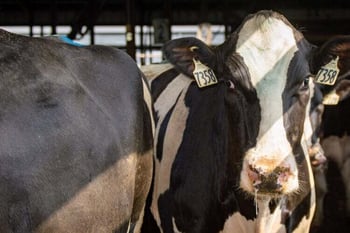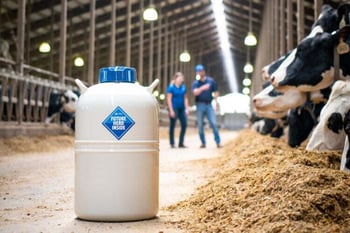Why is reproductive efficiency important?
Reproductive efficiency programs give options to a dairy! Farms that consistently turn open cows into pregnant cows minimize the number of replacements they need to grow or maintain their herd size. Additionally, more cows in the “next” lactation add greater milk production potential while maximizing replacement investment.
Have we made progress for reproduction?Absolutely! Over the last 20 years, dairy cattle reproduction has experienced a real turnaround. In fact, the average pregnancy rate improved by about 10 points, and days open decreased by more than 30 days! What role has genetics played in improving reproduction?Despite tremendous gains, much of the progress in reproductive performance comes from improved reproductive technologies such as Ovsynch, Double-Ovsynch, activity monitoring, and other techniques. |
 |
Why aren’t we making genetic progress for DPR?
There are two major challenges with Daughter Pregnancy Rate (DPR) as a genetic selection trait.
| Of all reproductive traits available, DPR has the strongest negative correlation or “resistance” to production. Of course, production continues to be a primary value driver of genetic selection today. | |
| DPR is a conversion of days open, where 4 days open = 1.0 preg rate, assuming a 60-day voluntary waiting period (VWP). This made sense in 2003 when DPR was first introduced when average days open was 154. But it doesn’t make sense for most progressive dairies today. |
Why is days open not an ideal trait to improve reproduction today?
As farmers become more confident that each insemination will result in a pregnancy, they tend to increase their VWP for first service. This is a step they make strategically to increase days open to achieve ideal results for other metrics like peak milk. This trend reveals a “Goldilocks” level for days open and for DPR. This is also known as an intermediate optimum trait. This at least partially explains why little or no genetic improvement has been seen over the last 20 years for DPR.
What are the best options to improve reproductive efficiency today?
Choosing a unit of semen that is designated as Alta CONCEPT PLUS or 511 CONCEPT PLUS is a simple and proven way to improve conception rates today by 2-5% for conventional semen and 3-7% for sexed semen!
There are several genetic traits that make sense to explore to improve reproductive efficiency.
Cow Conception Rate (CCR) and Heifer Conception Rate (HCR) are traits calculated from direct pregnancy diagnosis data. Introduced in 2009, positive values for CCR and HCR demonstrate improved efficiency of insemination by improving the ability of the female to conceive.
Can CCR and HCR replace DPR?CCR and HCR better align with the goal to maximize every insemination. Improving conception rates allows dairies to manage their insemination plan more precisely, whether for cows or heifers, using dairy or beef semen, or as sorted or conventional semen type. It’s important to note that since CCR and HCR were added to the Net Merit (NM$) index in 2014, both traits have proven the ability to improve both genetic and phenotypic output – unlike DPR. Further, both traits demonstrate less genetic “resistance” to production. Many top sires showcase leading levels for production while also improving CCR and HCR. |
 |
If improved reproductive efficiency is your goal, talk to your trusted Alta advisor about including CCR, HCR, and Alta CONCEPT PLUS sires in your breeding strategy.
Don’t have an Alta advisor yet? Fill out this form or send us an email, info@altagenetics.com and we will have one reach out to you.
Written by Phil Bachman, PEAK Global Product Specialist
Terminology Resource
Want to learn more about DPR, HPR and the other terminology used throughout this article? Check out this great resource Proof Terminology Explained.



